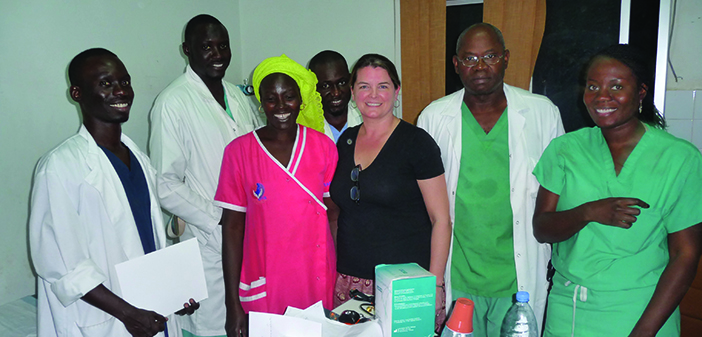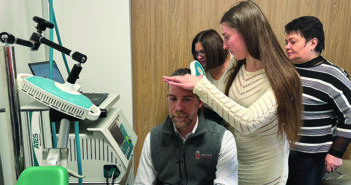A nonprofit provides sustainable cancer screening tools.
When Maggie Carpenter, MD ’91 visited Ethiopia in 2010, there was no cervical cancer screening being done in the northern Gondar region—even though the rate of death from the disease is extremely high there.
Carpenter knew the Pap smears performed in developed countries are too expensive and too involved to replicate in low-income ones. She realized there’s another process, called visual inspection with acetic acid, or VIA, that could work: the screening uses vinegar, which is inexpensive.
Carpenter founded Go Doc Go, a nonprofit made up of volunteer physicians who travel to under-resourced countries to outfit local health care providers with equipment and supplies for VIA as well as outpatient procedures to treat lesions. Volunteers train providers how to do the screenings and treatment so that the program can continue after volunteers leave. All funding comes from private donations.
“As a primary care doctor wanting to get involved in international health, there weren’t a lot of short-term opportunities, especially ones that were sustainable. I wanted to make sure that I was doing something that could continue whether I was there or not,” Carpenter says.
One of the first patients screened through Go Doc Go in Gondar had traveled nearly 400 miles to the hospital for something unrelated when doctors found a lesion on her cervix. She was the first woman there to receive cryotherapy.
“Had she not happened to come to the hospital that day for something else, she would have more than likely ended up with cervical cancer in a few years,” Carpenter says.
Roger Waltzman ’88 MD’92 is an oncologist who did clinical research in gynecological cancers. He and Carpenter met as undergrads at Brown and reconnected when she started Go Doc Go. Waltzman now sits on its board.
“It became clear to me that sustainability of an organization is critical in order for it to scale and grow,” Waltzman says. “[Go Doc Go] enables providers on the ground to do the screening with equipment that remains there indefinitely. We can expand, but they don’t need us forever.”
Kristen Austin, MD, a gynecologist based in Seattle, was teaching at the University of Gondar’s hospital in 2014 when Carpenter held a three-day training program for hospital staff, medical students, and residents.
When Carpenter left Gondar, Austin continued the program and made sure the equipment was being used.
“Because [Carpenter] had already established a relationship there and I was able to continue the training portion of it, we were able to get a solid program on the ground,” Austin says.
By the time Austin returned to Seattle a year later, the screening program was integrated with the residency training program at the university.
To date, Go Doc Go has screened approximately 2,500 women in Ethiopia and has new programs in Senegal and Haiti. The organization is considering developing a program to supply IUDs to health care providers in Haiti because of the threat of Zika there and the link between the virus and microcephaly.
Waltzman hopes to develop a program for Warren Alpert medical students or residents that would send them to under-resourced countries like Ethiopia to work on cancer prevention.
“There are so many different training experiences for students and residents at Brown. This would add immeasurably to that,” he says.




